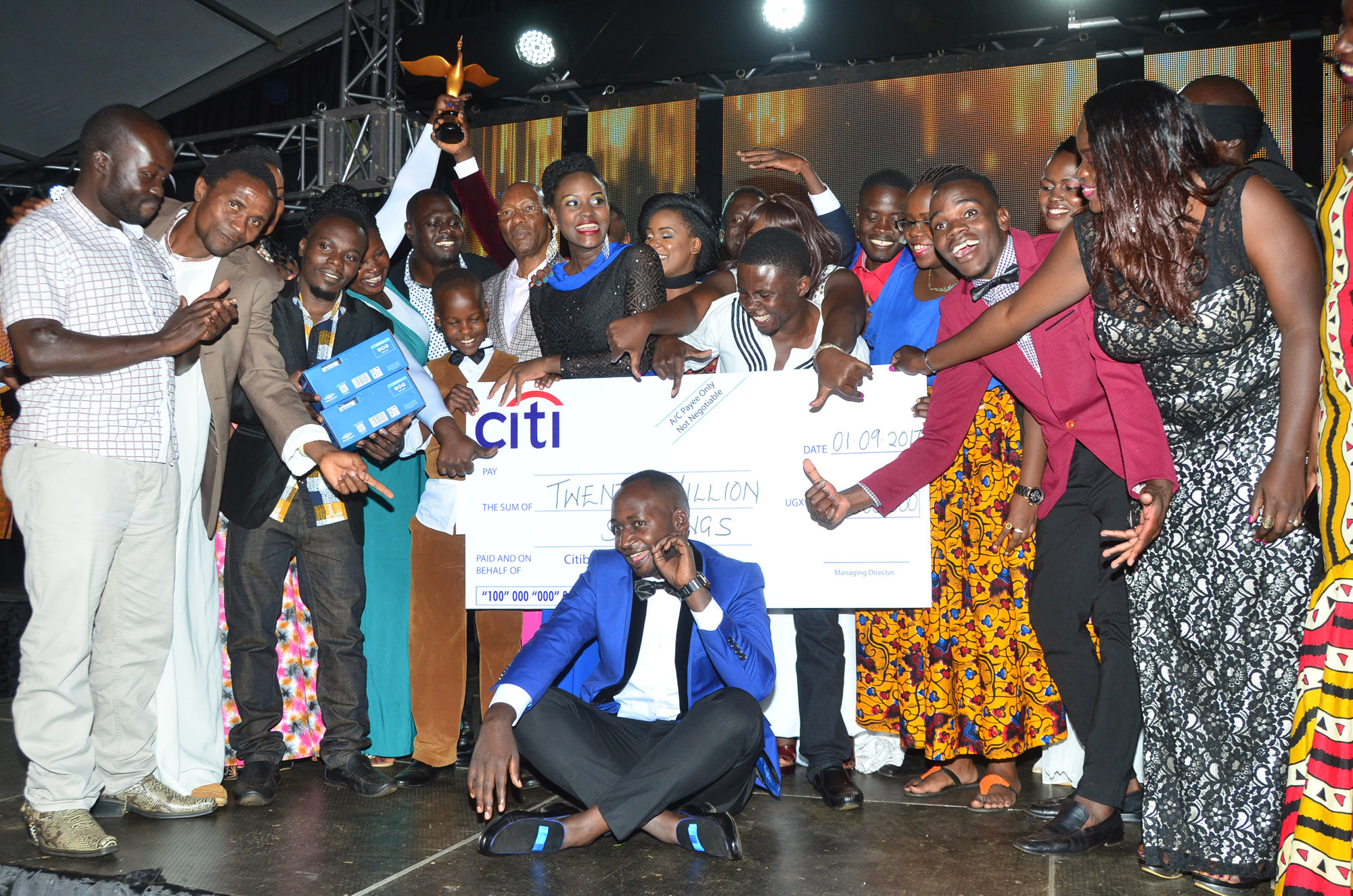
The film of the year cast (Devil’s cast) pose for a photo with their accolade as well as cheque worth Shs20m on Friday at Kampala Serena hotel last year. PHOTO BY MICHAEL KAKUMIRIZI
On Saturday, The Forbidden, a Ugandan film directed by Samuel Saviour Kizito became the first local feature film to win Amakula International Festival’s Impala Award for The Best Feature Film.
It is a descent film about a girl’s journey to find a father she never had, sadly though, when she finds him, she receives more than she ever bargained for.
It was credited as a descent film where many things were basic but was aided by a multi-dimensional story – in a jury statement presented, it was described as an African film coming of age whose strength was story that is well moulded, characters well defined – “the writer sold you his characters that at one point, you always felt like you knew what they were going to say based on what you know about them from the writing.”
Yet even with all the great reviews that may follow The Forbidden, its success at the Amakula festival may not guarantee success.
In most markets, film festivals celebrate a unique art of film for stories rarely conforming to the commercial rules of the art – they may decide to bring a new style to the art or tell stories funders never found profitable.
Since most of the festival films are done by independent film makers as opposed to famous studios, they may get lucky when a distributor like Lions Gate, Sony Pictures, Starz, HBO and Magnolia among others pick up a film that has received rave reviews.
In the past for instance Oscar nominated Mudbound and Birth of a Nation have been acquired by Netflix and Fox Searchlight Pictures for distribution at the Sundance Film Festival.
For those studio films that are not looking for distributor buy in, festivals are like positioning for major awards – for instance for over thirty years, people like Cher, Kevin Spacey, Woody Allen and Hilary Swank have won Oscars for films that screened at Sundance Film Festival.
In Uganda though, without a major distributor or award shows to position for, festivals would be a buy into the public, yet, even when such festivals like Pearl International Film Festival (PIFF), Uganda Film Festival (UFF) and Ngalabi Shorts among others exist, film as a craft remains very unpopular among the masses.
While presenting a jury statement for the Uganda Film Festival last year, Sr Dominic Dipio noted that the festival should start inviting entries from other countries and distributors to open the market up to foreign buyers, audience and exposure.
In her view, the move would expose Ugandan film makers to what people in the same African market are doing as well as introduce those film makers to Ugandan films and stories.
According to a film maker that had a film selected for the just concluded Amakula – many of them submit films for approval purposes; “they believe when a film is presented to buyers like DSTV when it has this festival success they will have better bargaining terms.”
But with festivals happening every other day, is the strategy paying off?
In Uganda, not many film makers have benefited from their wins, in fact, besides hefty cash given out by Uganda Communication Commission organised UFF, winning films are forgotten when the festival ends.
Industry players have in the past blamed festival organisers for handling their events the same poor way films are, “film don’t have an audience in the first place, you do a festival and still do a worse job at marketing it,” argued one.
He later added that besides some of these events counting years, they are yet to create an impact – “they don’t have an audience for themselves, how do you expect them to grow an audience for what they exhibit?”
Over the years, even when it is well funded, film makers have had to go through the trauma of having their films watched by cleaners and technicians of cinemas when UFF happens.
The raw deal the festival has with cinemas as exhibitors has Ugandan films screening between 10am and 4pm, from Monday to Thursday – these in the business are the most unfavourable days and time to have a screening that even when all these screening are free for the public, the spaces remain empty through.
Other festivals though programme better with Amakula throwing a drive in cinema experience into the mix but because they are poorly advertised and marketed, they are still attended by the same industry people.
PIFF happens for a few days at the National Theatre that has in the past years struggled to get an audience even for their calendar events while Ngalabi and Euro-Uganda festivals take place at private premises like Goethe Zentrum and Alliance Francaise that are not known to ordinary Ugandans.
But of course, the biggest short coming is that many festivals in Uganda are occasions rather than institutions – people host festivals for days or weeks and disappear for the rest of the year.
This is mostly because festivals are organised by entities that already have too much on their plates – for instance, Bayimba Foundation has a whole lot of a pre-occupied arts calendar with Amakula as one of the events and the same goes for UCC and their UFF, Goethe Zentrum or Alliance Francaise with Ngalabi and Euro-Uganda film festivals.
Without enough time dedicated to their programme films, these festivals come off as events that happen once in a big year and thus end up never achieving the mileage many think they were started for.
































































